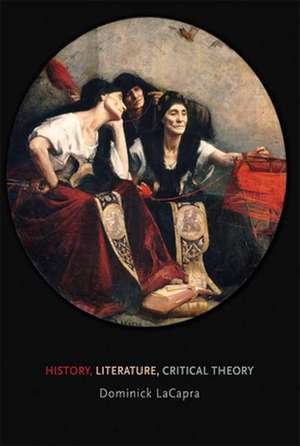History, Literature, Critical Theory
Autor Dominick Lacapraen Limba Engleză Paperback – 14 mai 2013
| Toate formatele și edițiile | Preț | Express |
|---|---|---|
| Paperback (1) | 250.94 lei 6-8 săpt. | |
| MB – Cornell University Press – 14 mai 2013 | 250.94 lei 6-8 săpt. | |
| Hardback (1) | 718.14 lei 6-8 săpt. | |
| MB – Cornell University Press – 14 mai 2013 | 718.14 lei 6-8 săpt. |
Preț: 250.94 lei
Nou
Puncte Express: 376
Preț estimativ în valută:
48.02€ • 52.15$ • 40.34£
48.02€ • 52.15$ • 40.34£
Carte tipărită la comandă
Livrare economică 22 aprilie-06 mai
Preluare comenzi: 021 569.72.76
Specificații
ISBN-13: 9780801478659
ISBN-10: 0801478650
Pagini: 248
Dimensiuni: 177 x 235 x 15 mm
Greutate: 0.36 kg
Editura: MB – Cornell University Press
ISBN-10: 0801478650
Pagini: 248
Dimensiuni: 177 x 235 x 15 mm
Greutate: 0.36 kg
Editura: MB – Cornell University Press
Descriere
In this book, Dominick LaCapra continues his exploration of the complex relations between history and literature, considering history as both process and representation.
